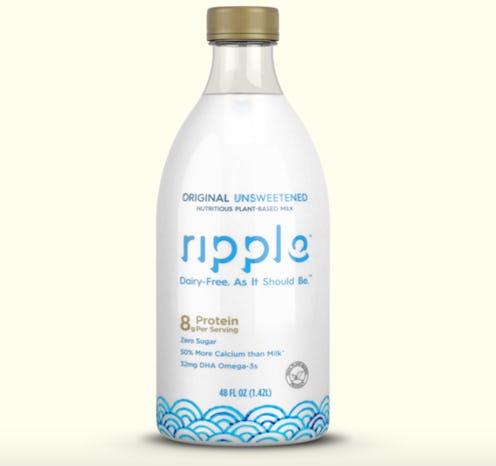Life
You'll Never Guess What This Milk Is Made Of

An interesting announcement just came from a company named Ripple Foods: They're bringing pea milk to grocery store shelves. What is pea milk? It's exactly what you think: A milk substitute made from peas. But before the thought of putting peas in a blender and then drinking them completely grosses you out (too late, although that's not actually how pea milk is made, so at least there's that), let's look at how pea milk compares nutritionally to other kinds of milk — because this could be what determines the type you reach for next time you stop at the grocery store.
Like you should be doing with everything else you put in your body, it's quite important to examine the labels and nutritional facts of the milk you're drinking, largely because key factors like sugar, fat, and protein can have such a huge impact on your body. We drink milk; we cook with it; we give it to our children. Of course we should care about what's in it and where it comes from.
It hopefully goes without saying that each kind of milk has its own unique pros and cons. Additionally, there is no "one size fits all" answer — no perfect, flawless solution — as to which milk is "best." You have to find what works best for your body. That being said, how can you expect pea milk to compare to other kinds of milk in terms of its main nutrients? I compared Ripple's original unsweetened pea milk with two percent cow's milk, unsweetened almond milk, and unsweetened soy milk to learn more.
Check it out:
1. Protein
Perhaps surprisingly, Ripple's pea milk has the same amount of protein as the same serving of two percent milk — around eight grams. Compared to almond milk, it has eight times more protein. And in terms of soy milk, pea milk has one more gram of protein.
So, on the protein front, pea milk looks to be A-OK!
2. Sugar
Pea milk definitely contains less sugar (zero grams) than two percent (12 grams). It falls right in line with unsweetened almond milk, while the common brand of unsweetened soy milk contains around one gram of sugar. Of course, if you choose any kind of sweetened or flavored milk or milk alternative (hi there, chocolate milk), sugar is going to be more prominent.
3. Fat
Pea milk has a good amount of healthy omega-3 fat, which holds all sorts of health benefits. Ripple's pea milk has five grams of total fat, on par with two percent. Unsweetened almond milk has about two and a half grams of fat, while unsweetened soy milk has about four grams of fat.
The differences aren't astronomical, and fat definitely is not the enemy; but almond milk looks to be the pick if limiting fat is a concern in your diet.
4. Calcium
You no longer have to drink cow's milk to get your calcium (unless you want to, of course), because pea milk has more — 450 milligrams versus cow's milk's 293 milligrams! It also has more than soy milk, while almond milk has never been known as a good source of calcium (although it does have other benefits).
Ripple seems to have quite a neat product on their hands. Keep in mind that most store-bought milk alternatives do have one downside compared to cow's milk: They contain a lot more ingredients, meaning they're less natural. But, as I said earlier, it's a personal choice that you have to make based on what your body likes. Ripple offers a vegan, lactose-free, gluten-free, nut-free, soy-free, and GMO-free (whew!) option, and options are always a good thing!
Images: Ripple; Giphy (4)